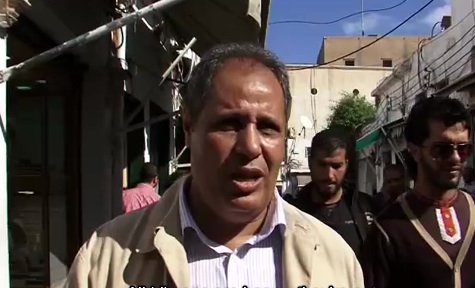
Tripoli, 28 October:
The challenges of best medical practice at the hospital in Misrata have become tougher because senior medical staff were killed during the revolution, according to the Franco-Libyan medical aid charity, ‘Comité du Soulèvement Populaire Lybien du 17 février 2011.’
The charity was founded and is headed up by Mustafa Shibani, (above) who lived for 30 years exile in France.
Inadequate training, a shortage of male nurses, low wages and poor hygiene are just some of the charity’s concerns, Comité nurse Patricia Jesberger has told Libya Herald. “There is a real lack of hygiene in the hospital.” Jesberger said, ”Surgical instruments are not sterilised, for example, and there is no procedure for washing hands between handling different patients.”
Jesberger said that the country’s hospitals have long had a poor reputation: “Libyan hospitals have always inspired distrust, even before the revolution. Most patients sought treatment abroad.” Following the revolution, and the loss of 22 senior medical staff, the situation at Misrata hospital has worsened.
After a visit earlier in the year, Jesberger said the French medical team completely understood the difficulties faced by the medical staff of Mistrata. She said the hospital had needed to treat many patients and deal with urgent injuries: “They provided high quality work in an extremely dangerous situation,” she said.
Although those most seriously injured in the conflict were evacuated to other countries, such as neighbouring Tunisia, the hospital still performed many operations, including some 300 amputations on adults and children.
However, the medical aid charity has raised serious concerns about hygiene during surgical procedures, since the revolution. For example, the same tourniquet is used for all patients and osteotomy scissors are blunt. The floor is not cleaned between patients and bins are not emptied regularly.
These hygiene problems lead to a high risk of infection for those undergoing surgery. Patients needing minor procedures often do not have operations because of this risk. “Most patients leave the hospital the day after their surgery, to prevent infection,” Jesberger said. She added that focusing on hygiene as part of the larger fight against infections was a priority for the hospital.
A co-ordinator at the hospital explained that many of the hygiene problems arose from “a chronic lack of cleaning staff,” a result of the repatriation of the mostly Moroccan and Nigerian cleaners. “He has assured us that a contract with a specialised company has been signed,” Jesberger added.
She has other important concerns: “The training of the basic staff – especially male nurses – is completely insufficient in Libya. We always encounter the same problem: salaries are very low in the sector and do not interest the men. Moreover, the women do not have easy access to the male patients.”
Medical staff, including doctors, are undervalued and not adequately financially recompensed for their work, she said, adding that this was very demotivating for the staff. “Most doctors work at the same time in a public hospital and in a private clinic to increase their salary,” Jesberger explained.
During the revolution, the charity sent essential medical equipment, including dialysis machines, wheelchairs, catheters and bandages to Libya. These were funded by private donations and the help of two French hospitals in Nantes and Saint Etienne.
When the conflict was over, the Comité sent a reconnaissance mission to Misrata. Both the visiting doctors and Mistratan hospital staff were unanimous, said Jesberger: “The needs were enormous and French support was eagerly awaited.”
The Franco-Libyan charity will be returning to Misrata in November on a five-day mission, to help boost the healthcare services the hospital can offer to local people. French medical staff coming to Mistrata from 9 to 13 November include Dr. Olivier Badelon, orthopaedic surgeon at the American Hospital in Paris, and Dr. Jean Brevet.
The charity is also planning a further mission with other much-needed medical staff, including a nephrologist, an urologist and a trainer for male nurses.
The Comité has been keen to help more hospitals in Libya, but a high staff turnover at the ministry of health has made this challenging. Jesberger said: “It is difficult to find at the Ministry of Health in Tripoli a reliable interlocutor with whom we can set up actions. During the last year, I have met five different people and all have left the Ministry.”
However, progress has finally been made. Jesberger and the head of the charity, Mustafa Shibani, have finally arranged to visit other Libyan hospitals in the coming weeks. [/restrict]





